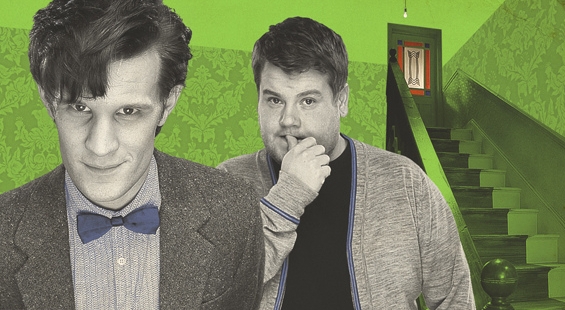How to be Doctor Who
I adore Dr. Who. I know that makes me sound like a nerdy goober, but c’mon, who doesn’t love a Time Lord with a yummy British accent?
Dr. Who takes ordinary people like shopkeepers, waitresses and secretaries, and shows them new worlds. I like that he challenges them relentlessly to be brave, to do what's right, and to draw on their greater, most powerful self.
A little woo-woo, yes, but you get the point.
The best part is that this whole new world benefits from just one ordinary person doing the right thing. Hey, even if Dr. Who occasionally calls the human race "stupid," he's still a positive force provoking great change.
I like Dr. Who most because I can relate to him. And you can too. You may not be a bow-tied, time-traveling, battler-of-evil, but you can certainly rely on your abilities to bring out the best in people.
Explore new worlds
Besides saying “brilliant!” and “fantastic!” a LOT, you can channel your inner Dr. Who by helping your clients explore new realms of health, awareness and well-being.
As a therapist, you have the power to influence people just by recommending something simple that helps them enjoy a healthier lifestyle.
Challenge your clients to do what’s best to improve their well-being. They’ll need to know this change won’t necessarily be an easy road - they’ll be drawing on their most powerful inner selves in order to change their lives for the better – but they'll reap enormous benefits that come from better lifestyle choices.
For example, chronic disease and obesity are at an all-time high, and they put tremendous pressure on our healthcare system, as well as our wallets. With each client you help set on the path toward a healthier lifestyle, you’re easing their burden – and the burden we all support. Everyone benefits.
Be smart
As a health practitioner, people naturally look to you for answers and they respect your judgment and counsel.
So keep up on the latest techniques, the new tips and methods of healthy living, the research findings and industry news, and be ready to share what you know and learn with your clients. It's just good business practice.
Of course, it’s good to stay up on current events and cultural happenings outside the wellness industry as well – you never know when you might need to whip out a really cool remark. Or just carry on a conversation that interests your client.
Make your own rules - {within reason}
It's good to have routines and rituals that help you be efficient and do a great job as well as treat clients to familiar patterns they come to expect when they visit you. Develop routines that begin when clients call for appointments and that follow through to the moment they walk out your door feeling great.
But clients and therapists are all unique, and sometimes the routine needs to be altered for an optimal experience. Do what works for both of you. Try something wacky like giving your established clients the option to listen to their favorite music during their massage session instead of Deuter or Enya, if they find it more relaxing.
Or paint a second studio room red and accessories with bright, verve-inspiring colors instead of sticking to zen-like taupe. Some clients might prefer to feel revitalized instead of downright sleepy.
Shake up the status quo, live a little – but only if it works for your clients.
Talk to everyone
Hey, you’re in the people biz – and that means you have to talk to them! Dr. Who likes to talk to everyone, but if you’re not a great conversationalist, you'll need to develop better communication skills.
Sometimes silence can be awkward, after all.
Do a comprehensive intake and schedule enough time between sessions to make a gentle transitional space. Rushing a client is not cool. Developing a relaxed, friendly rapport makes everyone feel better.
Ask clients questions and do a mini-intake before you get into each session. The answers they give open doors to conversation you can have with them that helps them relax. Listen to how they respond and take your cues – if a client talks animatedly in the first few minutes but begins to slowly wind down, you can too.
If you have a hard time remembering conversations between sessions to the next - make a few notes on a sticky and tuck it in their file.
Be a snappy dresser
More accurately, be who you are and don't worry about conforming to some image of what a therapist is supposed to look like. You're building a brand around who you are and what you can offer. What makes you different? Are you crunchy vegan with dreads, a no-nonsense medical professional, an artist, a vintage style diva, a mountain farmer...?
Go ahead. Be who you are and you will attract the right clients who will love you for it.
Most Importantly
The most important thing about Dr. Who is that he never loses sight of the fact that while he’s helping “average” humans, he acts mainly as a catalyst to their amazing powers. In the therapist/client relationship it's the client who drives the healing process and the therapist who is the guide.
You are your clients’ Dr. Who. Help them as best you can – and remember that they're just average people, like you.
P.S. Fellow goobers, are you curious about Doctor Who's Myers Briggs Personality Type? Well, this guy has an idea. What do you think, is he right?




Comments
Denise Stein
Feb 10, 2011
Permalink
I don't know enough about Dr. Who (must find time to watch more TV!) to comment on his personality type; but the most memorable (and therefore efficacious) statement Leigh made here is, "You are your clients' Dr. Who. Help them as best you can......". Whether we are offering or seeking therapy (physical or emotional) what is it really, if not guidance? Even (proper) medical treatment is guidance - guiding the body to repair/heal itself. So this rings especially true for me.
James
Feb 14, 2011
Permalink
Fire up the TARDIS!
Very fitting analogy between the role of a therapist and Dr. Who. I'm a fan guilty of only watching the show in quick spurts, indulging on several episodes all at once but then not watching for months, or even years. I found your analysis to be very true. He does help up develop agency and self-actualization, much in the way a good therapist can. Granted, I would hope my therapist never calls me stupid, but a healthy dose of misanthropy can shake loose the cobwebs when looking at problems.